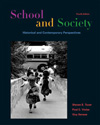 |  School and Society: Historical and Contemporary Perspectives, 4/e Stephen E. Tozer,
The University of Illinois, Chicago
Paul C. Violas
Guy Senese,
Northern Arizona University
Diversity and Equity: Schooling Girls and Women
Professional Vocabulary- Beecher, Catherine
- An advocate of women's education who remained prominent through most of the 19th century and who argued that women's education should develop their intellectual capacities for better execution of responsibilities in the woman's sphere.
- college education of women
- Historically restricted to males, college-level education of women began to be more common in the 19th century as women's colleges were founded, of which several exist today, though some have merged with historically male colleges; most women throughout the 20th century were educated in coeducational institutions, though for most of the century women's professional options were concentrated in teaching, nursing, social work, and other female-dominated occupations.
- colonial education of women
- Generally available only to middle-class white girls and women, usually provided at home by parents and tutors, and often justified by the need for women to be able to read the Bible and teach their sons.
- cult of domesticity
- Emphasized in the 18th and 19th centuries; the general view that a woman's place is in the home, with the corollary view that women should be educated to execute the responsibilities of home and hearth.
- Grimke, Sarah M.
- A radical feminist political activist and author who was prominent in the first half of the 19th century.
- Seneca Falls Convention of 1848
- Historically important conference on women's political and civil rights held in Seneca Falls, New York, featuring notable activists such as Elizabeth Cady Stanton and the abolitionist Frederick Douglas.
- Troy Female Seminary
- Founded by Emma Willard in 1821 in Troy, New York; a school for young women that prepared hundreds of schoolteachers for eastern schools before the normal school system was developed by Horace Mann.
- Willard, Emma Hart (1787-1870)
- The founder of the Troy Female Seminary in Troy, New York, and a prominent advocate of women's education.
- Wollstonecraft, Mary
- An 18th-century British feminist who argued for political and civil rights and equality for women and wrote that marriage was an ingenious device for enslaving women; author of Vindication of the Rights of Women (1792).
|
|



 2002 McGraw-Hill Higher Education
2002 McGraw-Hill Higher Education